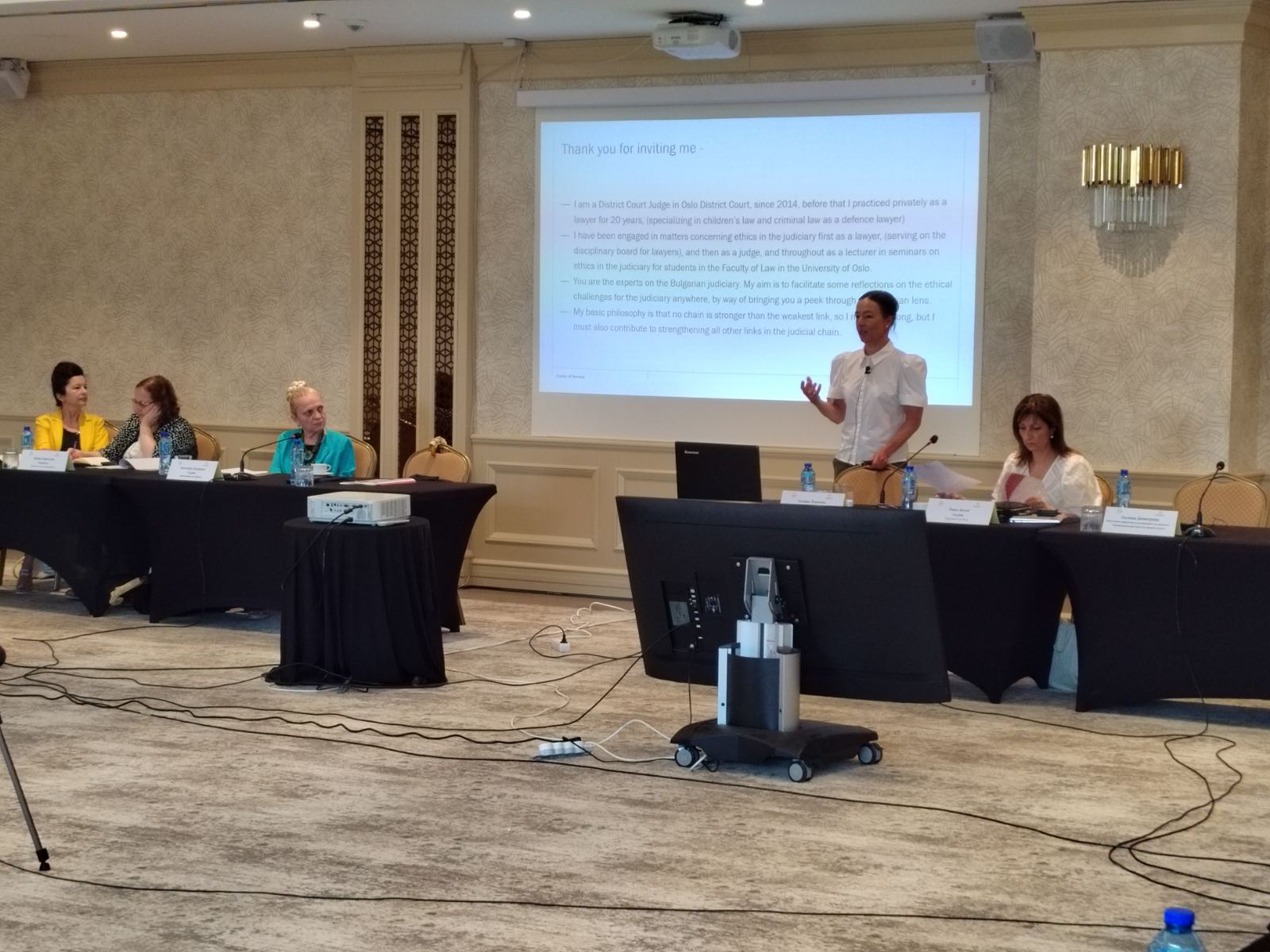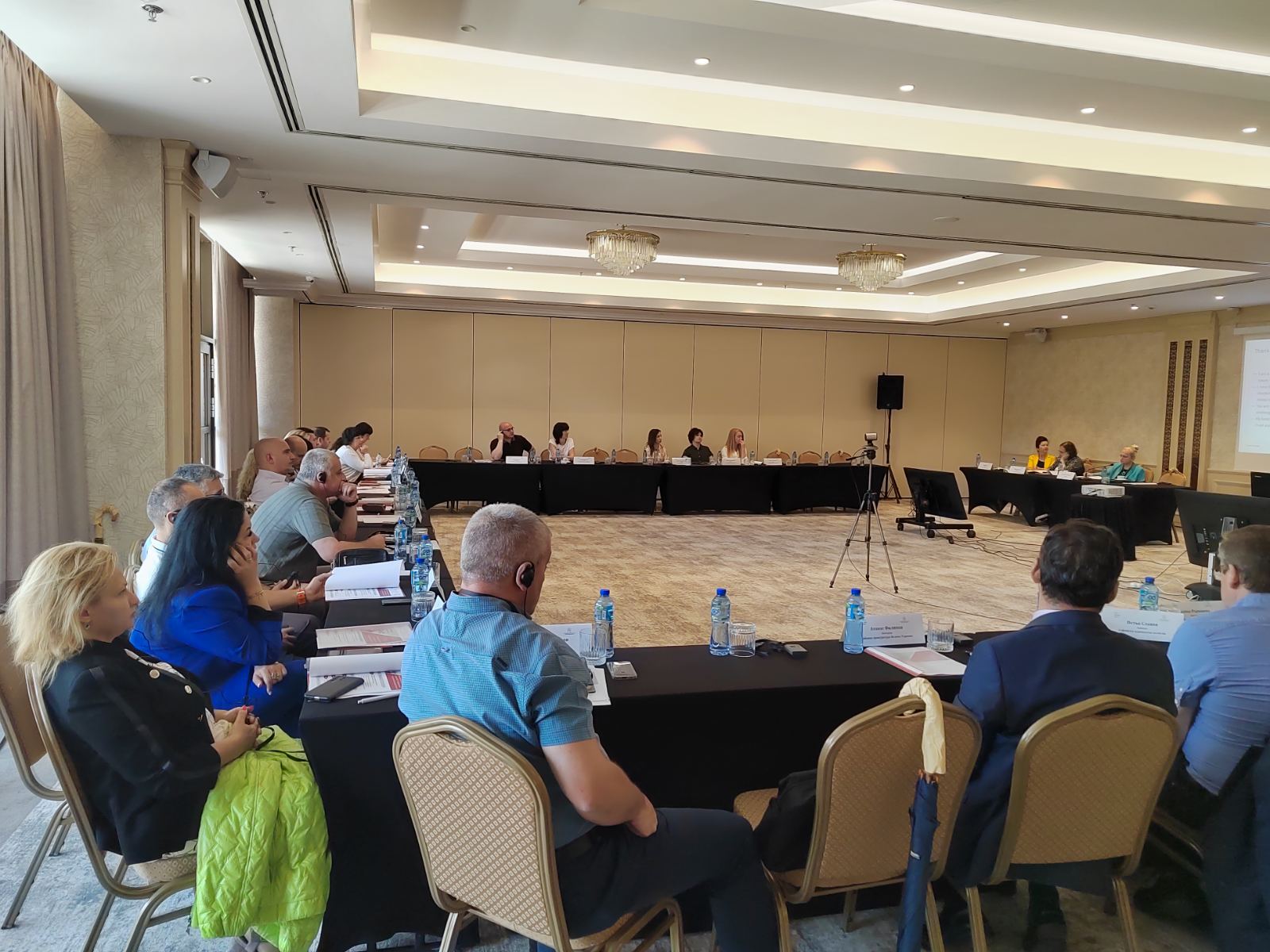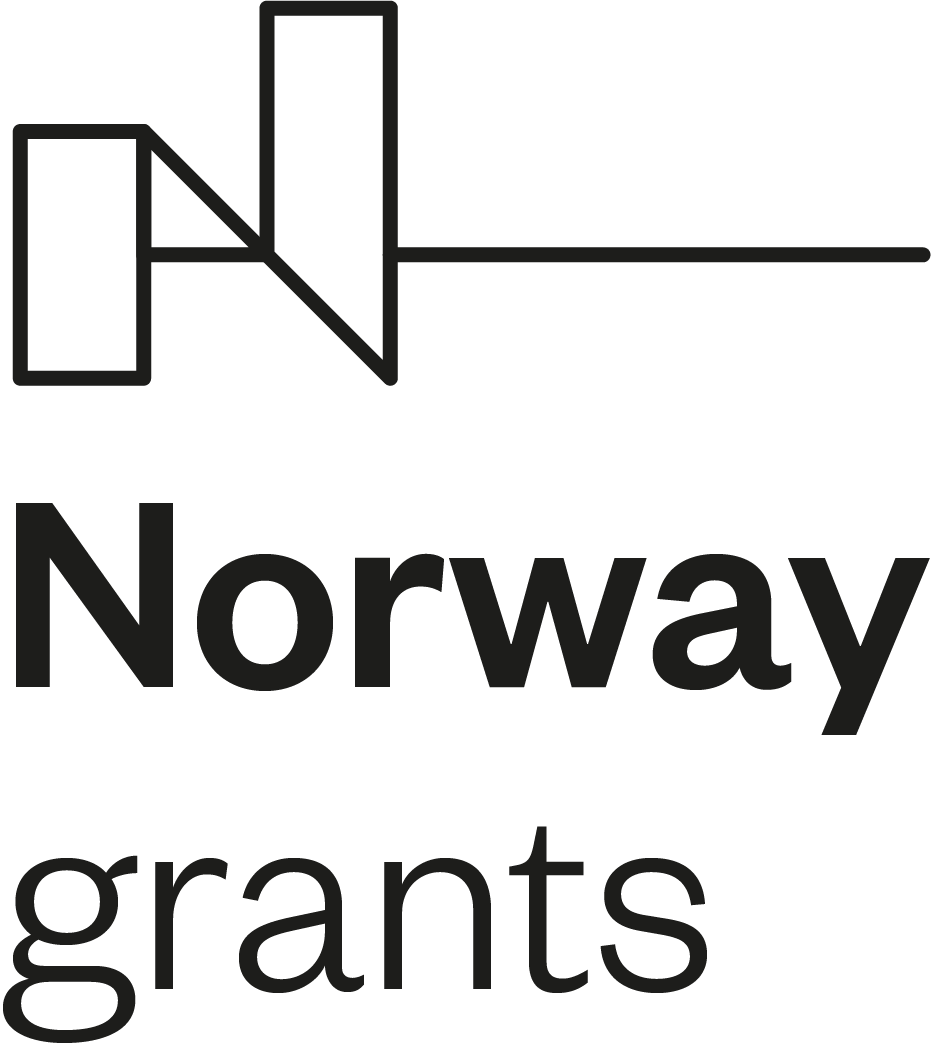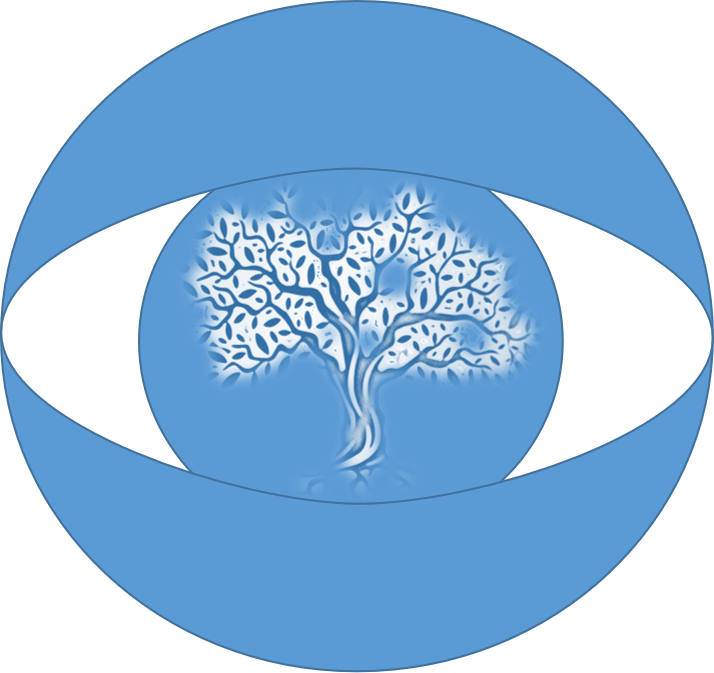 On 4 July 2023 in Sofia, during the second session of the Human Rights Forum, the opening presentation of the Online Platform of the National Institute of Justice (NIJ) on judicial ethics – ‘Justice Ethics’ took place. Challenges and elections.”. At the opening, the director of the NIP, Mrs. M. Tacheva, thanked for the enthusiasm of all those involved in the implementation of the platform.
On 4 July 2023 in Sofia, during the second session of the Human Rights Forum, the opening presentation of the Online Platform of the National Institute of Justice (NIJ) on judicial ethics – ‘Justice Ethics’ took place. Challenges and elections.”. At the opening, the director of the NIP, Mrs. M. Tacheva, thanked for the enthusiasm of all those involved in the implementation of the platform.
Judicialethicsplatform.nij.bg is created in Bulgarian and English and enables anyone who wishes to learn more about the ethical standards of Bulgarian, European and magistrates from other countries to do so within a click away. Within a year, even before it was officially introduced, the platform gathered nearly 8,400 visitors from around the world and over 31200 individual visits.
The existence of such an electronic resource allows the achievement of speed, completeness and accessibility in the provision and use of specialised information. The idea is also supported by the increasingly tangible need for clear boundaries between the conduct of the magistrate, which is in line with ethical standards and what violates them. Ethical patterns of conduct are of the utmost importance in the turbulent present, and every magistrate should be aware that the legal norms in the field of ethics are valid both in the course of the judicial process and throughout the life of representatives of the judiciary. After all, we’ve all heard: A magistrate is a magistrate even when he takes out his trash. The platform outlines the digital framework that can be filled with inexhaustible diverse content.
In the preparation of the current sections of the digital space for collective discussion of ideas, for obtaining additional information and for learning about everything important, happening around the world and raising daily issues in the field, representatives of the community “Judicial Ethics” of the NIP are involved. Reasons for discussion are the harmonisation of ethical rules, the place of empathy in decision-making in the courtroom, the challenges related to the presence of magistrates in social networks, the reporting of irregularities against colleagues in maintaining judicial independence, etc. In the core of the team are Judge Angelina Lazarova of the Court of Appeal – Varna, the junior judges Kalina Stancheva from the Sofia City Court and Radoslav Angelov of the District Court of Lovech, and Junior Prosecutor Georgi Kodzhanikolov from Regional Prosecutor’s Office Plovdiv.
The event, organised by the NIP, presented the platform to 49 judges, prosecutors, investigators lawyers, psychologists and public figures. After familiarising the attendees with the content of the platform and addressing some of the issues found in it, the audience discusses the current sound of the basic principles of judicial ethics, verbal and non-verbal communication, collegiality, including in the field of international cooperation. The meeting was skillfully moderated by Rositsa Toncheva, a judge at the Varna Court of Appeal and a long-time judicial trainer on ethics and professional behavior at the NIP.
The forum presented the activities undertaken by the NIP in the field of training on “Judicial Ethics”. The “Handbook on Independence, Impartiality and Integrity of the Justice System”, issued in 08.2022 by CEELI Institute, Prague, Czech Republic, was officially presented, together with its translation into Bulgarian. The text of this handbook, you can find among the sources of the platform, we are also planning a publication on its contribution to solving ethical dilemmas by the representatives of the judicial systems.
 A lecturer and participant in the meeting was Judge Rique Lassen of the District Court in Oslo, Norway. Judge Lassen has sincerely and objectively presented the rules governing the professional conduct of judges in Norway, where confidence in the judiciary is 87 %, highest in comparison with other authorities, and fourth in the world by this criterion. He provoked the audience with a real case of a Supreme Court judge in Norway, with outstanding legal knowledge and highly respected in his country, who in 2022 made publicly, on television media charges against his ex-wife for poisoning him for years, shared about the subsequent public discussions and professional decisions related to his status as a judge. Judge Lassen described what was told about the biggest scandal in magistrates, still exciting the judiciary, the public and the media.
A lecturer and participant in the meeting was Judge Rique Lassen of the District Court in Oslo, Norway. Judge Lassen has sincerely and objectively presented the rules governing the professional conduct of judges in Norway, where confidence in the judiciary is 87 %, highest in comparison with other authorities, and fourth in the world by this criterion. He provoked the audience with a real case of a Supreme Court judge in Norway, with outstanding legal knowledge and highly respected in his country, who in 2022 made publicly, on television media charges against his ex-wife for poisoning him for years, shared about the subsequent public discussions and professional decisions related to his status as a judge. Judge Lassen described what was told about the biggest scandal in magistrates, still exciting the judiciary, the public and the media.
Judge Lassen shared a number of practices from the homeland on the application of ethics, disciplinary proceedings, the measures that may be taken in the event of certain infringements by a relevant body composed of representatives of judges, lawyers and members of the public. Explain the existence of “media judges” who only have the opportunity, and also the duty, to speak to the public, through the media, about cases of high public interest, while the other magistrates are “exempted” from the hypothetical opportunity to stand in front of the journalistic chamber and awkward questions. She said she would never accept flowers sent to her as judge, but would return them to their sender with a note explaining that she was following strict rules. The areas of legislation that need to be redefined in order to achieve a higher standard of independence of judges in Norway were also highlighted.Judge Lassen’s presentation can be found in English in the “Materials of Trainings” section.
Self-participation in the forum was attended by a lawyer. Eli Hristova, who analysed the disciplinary practice in the country vis-à-vis lawyers and magistrates. Prosecutor Sava Petrov presented the supranational standards for ethical rules of prosecutors and judges, andhis presentation can be found in the section “Materials of Trainings” (available in Bulgarian). It’s attorney-at-law. Penka Hristova commented on the block of anonymous questions presented by young magistrates in the “Questions of Ethics” section of the platform, on which, as a psychologist, she has reached other questions and answers, including the problems in the relations in the system, the need for attention and support to the individual magistrate and the building of personal qualities to achieve internal independence.
 All this proves that the topic of judicial ethics is increasingly shaken from the accumulated neglect in order to spiritualise the professional dialogue on strengthening the law and the independence of those called to it. The principles of professional conduct brought about by modern changes should be rethinked through an equal and sincere approach to the essential and meaningful. We believe that issues of this kind concern not only the acting magistrates, but also all involved in civic position. Therefore, we hope that the community of NIP “Judicial Ethics” will have further opportunities to unite the representatives of the national judicial system, to present the trends in the global judicial ethics and to draw out the good practices. Until then, the materials and resources of judicialethicsplatform.nij.bg are available to solve the problems and challenges we face in the course of applying ethical rules.
All this proves that the topic of judicial ethics is increasingly shaken from the accumulated neglect in order to spiritualise the professional dialogue on strengthening the law and the independence of those called to it. The principles of professional conduct brought about by modern changes should be rethinked through an equal and sincere approach to the essential and meaningful. We believe that issues of this kind concern not only the acting magistrates, but also all involved in civic position. Therefore, we hope that the community of NIP “Judicial Ethics” will have further opportunities to unite the representatives of the national judicial system, to present the trends in the global judicial ethics and to draw out the good practices. Until then, the materials and resources of judicialethicsplatform.nij.bg are available to solve the problems and challenges we face in the course of applying ethical rules.


